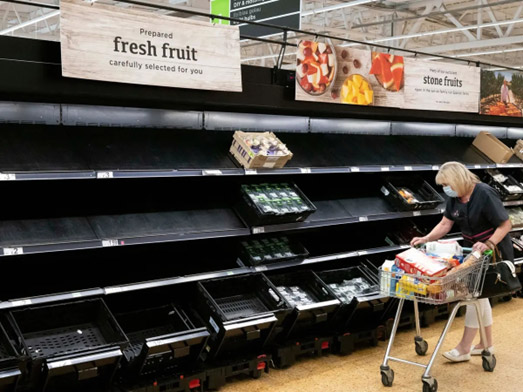Paper mill strikes are over…… But label industry not out of the woods yet!
 Redcar firm in good place to respond to label supply issues.
Redcar firm in good place to respond to label supply issues.
Strike action which prompted fears of a major label shortage may be over – but the fallout will be felt for some time yet.
Industrial action at Finnish paper mills, combined with increases in energy prices, delivery times and raw material costs, had business analysts fearing serious supply chain issues throughout the label industry.
The strike began on January 1 and lasted more than four months – the longest industrial action of its kind in Finland – before a settlement was finally reached last week.
Around 2,100 workers at UPM paper mill were on strike, with 200 of them working on tasks deemed critical to society.
UPM supplies paper for two of the UK’s three main printing operations, as well as label operations across Europe.
Printing industry leaders have now reacted with relief that the action is now over – but questions remain over how long supplies will take to get back to normal.
Until they do, however, Redcar-based First Choice Labels says it’s well placed to respond to any self-adhesive label shortages in the next few months, having taken steps to safeguard supplies.
Before the strike took hold, the company acquired a second warehouse for material deliveries and storage.
Located within 800 yards of the main FCL factory on Redcar’s Kirkleatham Business Park, it has been fitted with high level pallet racking and computerised stock control.
And, crucially, it means FCL can store more than 3m linear metres of materials – allowing it to maintain or even reduce delivery time to its customers.
So whatever shortages and delays occur with other label manufacturers, the foresight to order in extra materials and get extra premises means First Choice Labels is in a good position to rise to the supply challenge.
Managing Director Nigel Willis explained: “This facility allows us to insulate our customers from the worldwide material shortage which is being felt so sharply by end users across all sectors.”
“And if it’s being felt sharply now, there are fears supply issues may worsen before they get better as the aftermath of the strike action continues to bite.”
While labels may not be as critical to goods distribution as ships, trucks and fuel, they are a vital part of everyday supply chain operations.
Everything needs a label – from food and pharmaceuticals to those used in the logistics and transportation industries.
That meant any significant shortage in labels threatened to stifle a supply chain already strained by the Covid-19 pandemic, inflation and now the war in Ukraine.
The strike in Finland was critical to the label industry because one of the firms affected, UPM, is the leading supplier of release base paper – the liner from which labels are peeled – and face papers – the actual labels that are printed on.
Had the action continued, label suppliers may have been faced with prioritising distribution to specific industries, such as healthcare, to keep the supply chain moving.
According to Europe-wide label association FINAT which, before the strike was called off, had been predicting a year of packaging woes, 8bn square metres of self-adhesive label materials are used annually in Europe, amounting to a staggering 240 billion labels across a variety of sectors.
The strike was part of a pay and conditions dispute between UPM paper mills and Finnish paper workers’ union Paperiliitto.
Before the action was called off, British Printing Industries Federation CEO Charles Jarrold said the paper shortage was a “grave threat to our supply chains and, ultimately, to the products available for customers.”
He told The Grocer magazine: “Without labels, packaged goods cannot come to market and consumers will suffer the loss of many everyday items – food, drinks and medicines to name a few key areas.”
Mr Jarrold now admits he’s “relieved” the strike is over, but stresses that challenges still lie ahead.
He said: “From the BPIF’s point of view, we are delighted to hear the news that agreement has been reached – the disruption really was the last thing the sector needed with so many other challenges in the supply chain.
“We’ve been working closely with the most affected parts of our industry who’ve had a pretty torrid time trying to prevent critical supply chains being even more disrupted.
“We’ve also kept government closely advised, as it’s been an area of concern for them – particularly in respect of the food and pharmaceutical sectors, and they’re pleased and relieved to hear the news too.”
For further details or advise on how to avoid long lead times please contact First Choice Labels on

